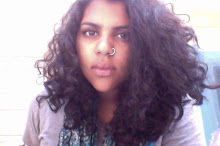My mother grows nostalgic over her wedding days in the kitchen as we grind rice. Da fire pyre caast shaadows aghainst my skhin, my bhangles cawtch da light. Dey glittered in da heet she sighs, her hands sliding over her arms, remembering the coolness of glass against her skin. She was 17. And the next day, she and her doctor husband in an ill-fitted suit who was to become a physician in Canada, peered over the Atlantic Ocean, her glass bangles shaking, nervous in flight. Tata, India. Amireeka, jal ra ho!
Be gentle wid da rice. Each grain has your faaders name caarved in it she scolds me. Her fingers move in cyclic patterns, putting the motor to ease, bangles sliding over her forearm. A real voman can cook. It is da vonly vay she caan conqueer herr husbhand she instructed, eyebrows knit. Oh yes, she knew all of it. Her life spent in her mother’s classroom: the kitchen. Women in my village were raised for the purpose of pleasing her maharaj. Her soon to be husband. My mother was raised in a large joint family. Girls would spend their days in petticoats in the protection of papaya trees from the unforgiving Andhra sun. Da lighterr a girl’s skhin, da more preety she is. Her mother told her. My mother, scouted by the Indian Olympics for high jump began to hide behind parasols. No wonder my mother is the color of milk. I too had the same destiny. Imagine ruddy Indian tom boy jumping to scale trees with her White neighbors. My mother would open the door, call me in, and rest cold towels on my skin, terrified of burns. Those glass bangles cool against my skin. Inkoka saree chae ado. Never again. Never again. She scolded me in Telugu.
Priyanka, vhy are your nails so deerty? Have you been outside? My mother pulls my hand to the window. I giggle. Vhat man vill vant dis? We both throw our heads back and cachinnate. Men. An Indian woman’s world revolves around them. From birth, a baby girl is handed not to her mother, but to her father. When it is her time to marry, she is passed from father to husband. Never mentioning her authority of being a woman, she is jaydaad, property; her value is trapped in her bangles. Believe me, my mother was different before marriage. She once ran wild like a river, full of laughter. Bold. But she knew her fate like every woman in my family. It was an age old burden that rested on the hips of women. She married a man fifteen years older than her. He was kind, quiet, determined, religious, and of the same caste. It was a marriage that was mapped in the stars. Elders praised it as a ‘marriage of the cosmos’. Mother had no choice but to fold her hands and stop running. Bangles were slipped on. She became a woman.

And so here I am: stuck between the cross roads of familial obligation and autonomy. Sometimes I want to scream! I want to lash out and defy the resonance in my marrow. Shrouded in the double standard of parasols and IR theory texts, my sexuality and my purpose are blurred like sand. I am proud of my heritage, proud to be the exception to the rule of women who could have been Olympic athletes and painters but never could. But I can be. Anything. Almost. I can be independent. Almost. I can be an anthropologist travelling the gentle neck of the Yucatan. Almost. I can be queer. Almost. My dreams are hidden behind my mother’s parasol just dying to get out. Wrists grow tight. I wonder if I can already feel the Almost weight of wedding bangles. But alas, I can only imagine.
Mama slipped her hands through my hair. Learn houve to cook rice before college! You must feed yourself too. Take care, nah? My mother never wanted her future for me. She dreamed of me reading and learning and running. Never stopping. No. Not for any man. She reminds me of what I am. She makes me conscious of what I was supposed to be: don’t forget, nana, dat no oder girrl in da family has gone to coleege. Be great for us, nah? But then why the rules? Why am I placed in the same classroom my mother was placed in, and her mother, and her mother, and her mother? Why the shared history of property? The answers are etched in the movements of my mother’s hands: My mother gets joy from cooking for my father. When rice melts in his mouth, my father sighs and holds her forearm. She giggles and winks at me from across the table.
“Ma, would you rather be a boy? You know you could of ran.” She rests her hand on her hip making the perfect curve of her perfect figure.
No. Men cannot do vat I do.
“And what is that?”
Surre I cannot run. Surre I stop school vhen I was fifteen. Surre I stay home all day. But I am vitaal. Do you tink your lazy ass faader can survive wid out me? Can he cook, clean, take care off himselve? Boys seldome become men. Like I vas passed by my faader to your faader, your faader was paased by hiss moder to me!”
She laughs at the thought, her thick hair sliding off her shoulders. Humorous liberation in small ways is what keeps my mother alive. And her mother, and her mother. And every woman who has ever been tied to a man for the rest of her life after meeting him a handful of times. Don’t forget deer. You arre a voman. Voman caan do anyting. Our cacchination sharp like the clinking of bangles.


No comments:
Post a Comment